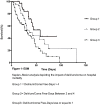The impact of acute brain dysfunction in the outcomes of mechanically ventilated cancer patients
- PMID: 24465538
- PMCID: PMC3899009
- DOI: 10.1371/journal.pone.0085332
The impact of acute brain dysfunction in the outcomes of mechanically ventilated cancer patients
Abstract
Introduction: Delirium and coma are a frequent source of morbidity for ICU patients. Several factors are associated with the prognosis of mechanically ventilated (MV) cancer patients, but no studies evaluated delirium and coma (acute brain dysfunction). The present study evaluated the frequency and impact of acute brain dysfunction on mortality.
Methods: The study was performed at National Cancer Institute, Rio de Janeiro, Brazil. We prospectively enrolled patients ventilated >48 h with a diagnosis of cancer. Acute brain dysfunction was assessed during the first 14 days of ICU using RASS/CAM-ICU. Patients were followed until hospital discharge. Univariate and multivariable analysis were performed to evaluate factors associated with hospital mortality.
Results: 170 patients were included. 73% had solid tumors, age 65 [53-72 (median, IQR 25%-75%)] years. SAPS II score was 54[46-63] points and SOFA score was (7 [6-9]) points. Median duration of MV was 13 (6-21) days and ICU stay was 14 (7.5-22) days. ICU mortality was 54% and hospital mortality was 66%. Acute brain dysfunction was diagnosed in 161 patients (95%). Survivors had more delirium/coma-free days [4(1,5-6) vs 1(0-2), p<0.001]. In multivariable analysis the number of days of delirium/coma-free days were associated with better outcomes as they were independent predictors of lower hospital mortality [0.771 (0.681 to 0.873), p<0.001].
Conclusions: Acute brain dysfunction in MV cancer patients is frequent and independently associated with increased hospital mortality. Future studies should investigate means of preventing or mitigating acute brain dysfunction as they may have a significant impact on clinical outcomes.
Conflict of interest statement
Figures



References
-
- Milbrandt EB, Deppen S, Harrison PL, Shintani AK, Speroff T, et al. (2004) Costs associated with delirium in mechanically ventilated patients. Crit Care Med 32: 955–962. - PubMed
Publication types
MeSH terms
LinkOut - more resources
Full Text Sources
Other Literature Sources
Medical

